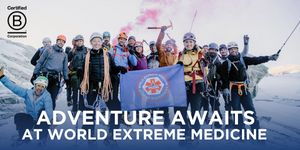Dr Constance Osborne / FY2 / Bristol, UK
The course is run by World Extreme Medicine. A UK-based organisation born out of expeditions over 25 years ago. Alongside consultancy and medical support, they deliver expedition medicine training around the world for healthcare professionals wanting to add more adventure into their careers.
Key facts
What / An intensive four-day expedition and wilderness medicine course comprising lectures and workshops which culminated in a large-scale search and rescue moulage on the fells.
Where / Keswick, Lake District, UK
When / March 2022
How much / £995 including meals and accommodation costs.
Experience required / Nil
Qualification/Accreditation / Certificate of completion and 24 hours of CPD
Delegates / 50 from various healthcare backgrounds

The Course
This was a four-day residential course based in Keswick, North Lake District. One delegate described it as ‘a grown-up school trip’, an apt comparison. The hostel we stayed in had beautiful views over Derwentwater and we saw it in all weathers over the week. We slept in dormitories and were fed three hearty meals a day. The surrounding area was stunning, the perfect setting for a wilderness medicine course.
The instructors running the course were from a variety of backgrounds; doctors, critical care paramedics and mountain rescue volunteers, all with a wealth of experience to share. Doctors from consultants to F2s, nurses, paramedics and a pharmacist attended from across the UK and further afield from places such as Canada, Australia and Switzerland. Due to external factors, a couple of lecturers were unable to speak on the course however, the omissions were barely noticeable in the busy schedule and it allowed for more free time to adventure with other delegates in the surrounding area. Most days ran from 8 am to 8 pm with regular breaks.
In the evening there was time to relax and socialise with the other delegates in the common areas and a conveniently situated bar within the hostel received a fair amount of business. Everyone brewed plans for various activities outside of the curriculum. For those that liked to climb, wild swim or trail run, there was ample opportunity and those that brought kit made use of it. As a junior doctor, it was a great opportunity to discuss clinical and career aspirations not only with the faculty but also with other delegates.
Course Content
The course covered a broad range of topics. There were lectures on the practicalities of expedition medicine such as conducting a primary survey, common medical problems and fracture management. The course also explored humanitarian medicine, human factors and extreme environments. Some of the small group workshops were delivered indoors, although when the weather permitted topics such as radio communication, package and move and triage were conducted in the hostel gardens. Personal highlights included how to build a medical kit, a talk on careers outside a traditional pathway by Dr Abbi Forsyth and a lecture on dive medicine by Dr Aaron Gao.
The first two days of the programme were bracketed by lectures in the morning and the evening whilst the bulk of the day comprised a variety of workshops. On Wednesday morning a local guide taught us survival skills, orienteering, ropework. We put our hiking boots to good use and learnt about wind chill first-hand. Other highlights included an extrication workshop run by a local mountain rescue GP and experimenting with a portable hyperbaric chamber. On Thursday, the course was capped off by a search and rescue practical in which delegates were sorted into different teams and given coordinates to an injured person that they would be required to stabilise and evacuate. I felt this was the perfect opportunity to put our skills to the test and see some of the human factors we had discussed play out.
The Verdict
I thought this course was excellent, undoubtedly due to the organised and passionate individuals who ran it. Other delegates said they felt inspired and motivated to explore expedition or wilderness medicine career options when they returned to work. Even those who had undertaken similar courses felt that they had gained a lot from conversations with experienced instructors. That said, I think it would be especially beneficial for those with minimal exposure to expedition and wilderness medicine. If you are more experienced or looking for a course that will prepare you physically for the trials of an expedition and a more intimate course group, I would consider exploring other options.
The cost is reasonable considering that accommodation and meals were included, as well as the sheer volume of course content. There was an option to stay at the hostel the night before the course started and this additional cost was necessary for many as we started promptly at 8 am the following morning. Some delegates were able to get funding from a study budget (the paramedics seemed to be quite lucky in this department) and for those in a training programme, it qualified as study leave. A WhatsApp group was created before the course to facilitate lift sharing across the UK and reduce travel costs.
I think what distinguishes this course from others in the field is that the residential aspect of it is hostel based. Although it may not mimic the expedition environment as much as other courses, I believe it leads to greater accessibility. One of the best aspects of the course was the large pool of delegates and I feel I gained much from interacting with the splendid variety of clinicians the course attracted.
To find out more about World Extreme Medicine’s Wilderness and Expedition Medicine Course in the Lake District, see WEM’s website.
Photos courtesy of Constance Osborne.









